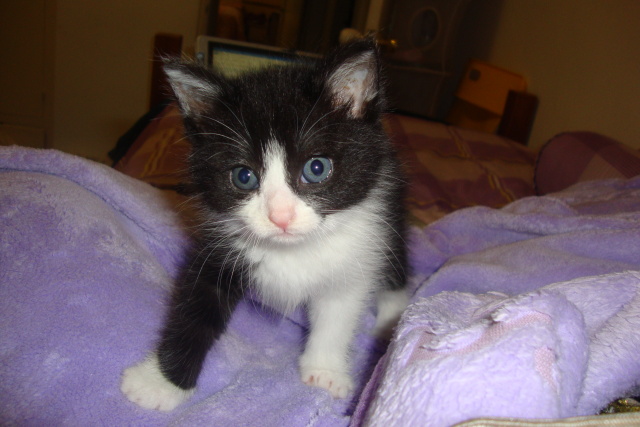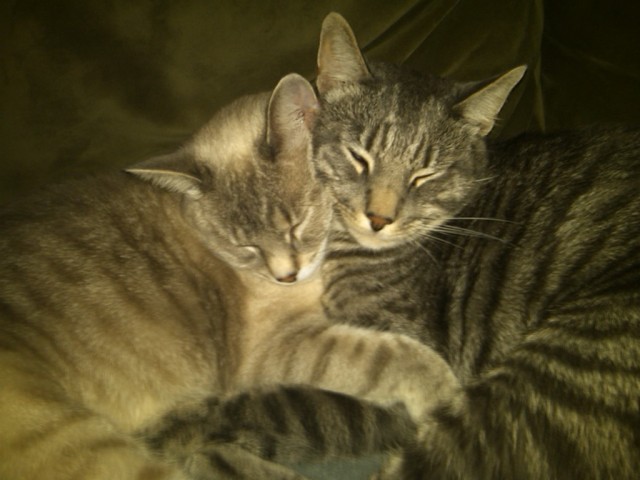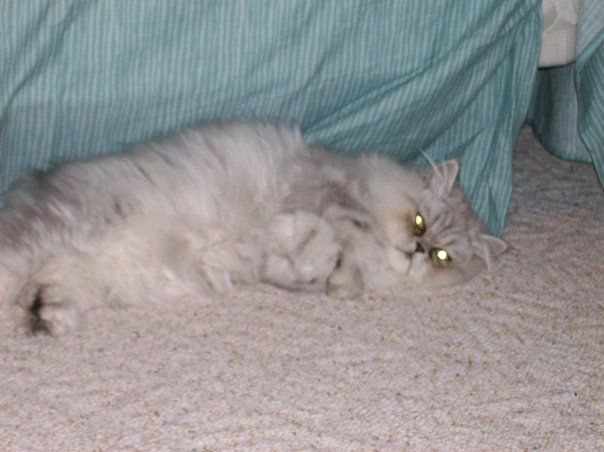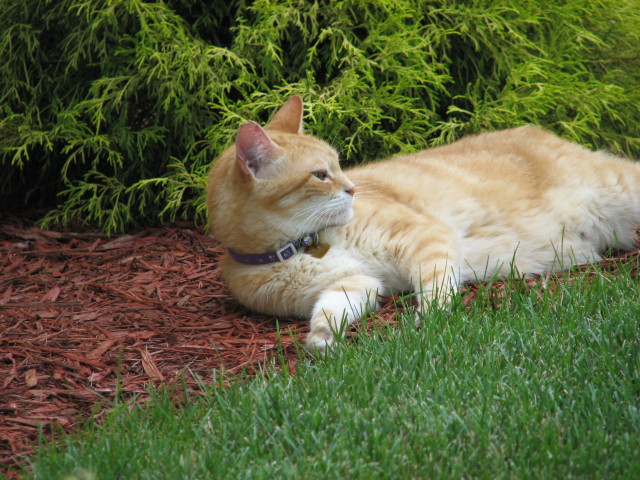QuestionDear Ali,
I recently adopted two 13 week old kittens (they have been with us for 2 weeks now), the girl is very nervous and timid, whereas the boy was very cuddly and outgoing.
Unfortunetly, this weekend we had an awful accident with the boy kitten - he darted underneath my husbands feet and my husband tripped over him and very sadly he passed away due the injuries. We are absolutely devstated and blame ourselves for it - which is pointless but we are so upset at what has happened.
My main concern now is Annie, the sister kitten. She has always lived with her brother and was very dependant on him. She is not eating much but seems to want to play?
We would like to get her another companion but want to make sure we get this right - for her sake.
Please can you give me some advice on whether another kitten is a good idea, which sex and if we can introduce 2 new kittens to her?
Thank you
AnswerRachael,
Many people believe that cats aren't really aware of their surroundings or that they are cold, aloof animals who are obsessed with their wants and needs. Cats are quite territorial, but this doesn't make them unresponsive and self obsessed. Cats are sentient beings and they feel love and attachment for people and other animals in their environment. It is quite likely that Annie is traumatized by the accidental injuries that caused her brother's death. Grief is also a normal reaction for cats. When a cat loses a person or other animal that is important to them it's quite common to see signs of grief. It's not uncommon for cats to become depressed after losing an important person/pet in their environment. Cats will often eat less than they normally do as a result of their depression. Cats can become mopey, sleep more and be less interested in their environment.
Many people don't believe that cats are actually aware of their surroundings and mistakenly believe that cats don't care about what happens in their environment as long as they are fed. This misconception couldn't be further from the truth in my opinion. It's important to realize that Annie may simply grieving the sudden loss of her brother. The symptoms that Annie is showing can be an indication of serious illness so I highly recommend that Annie is assessed by a qualified vet just to make sure that there aren't any medical reasons for Annie's symptoms. Grief and depression are really tough for a cat to cope with so you will need to remain vigilant in checking for any indication of illness for the amount of time that Annie is grieving. It's not a bad idea to go ahead and get a consultation with a holistic vet in this case. Holistic vets are trained in conventional medicine as well as alternative therapies like homeopathy, acupuncture or massage. A holistic vet may well be able to recommend a pharmaceutical free way to help Annie out of her depression. In the meantime I would recommend that you try using a homeopathic remedy called Bach's Rescue Remedy which is a blend of flower essences that works to calm and reassure. Generally Bach's remedies can be found in health food/natural health stores, often times the locations that sell these homeopathic remedies will have a cardboard wheel that matches symptoms with appropriate remedies. Rescue Remedy and Bach's homeopathic remedies in general are very safe and they are often used by conventional vets and holistic vets to treat a variety of conditions. I would recommend that you try a dose of about 8 drops of Rescue Remedy in a fresh bowl of water every morning. You may be surprised at the difference in Annie.
My heart goes out to you, your husband and Annie for the loss of your other kitten. It is always tough to lose a pet unexpectedly regardless of the circumstances. I am confused as to how simply tripping over a 13 week old kitten could sustain injuries that the kitten died as a result of. Cats and kittens are actually remarkably resilient and they do survive injuries that are much more serious without question like falling from a balcony 20 floors above ground to being hit with a 3,000 lb vehicle. I am wondering if your vet was able to provide a cause of death when you sought treatment for the little boy kitten's injuries.
To be completely honest I have tripped over countless cats and kittens over the years and in some cases I have even landing partially on a kitten's body. I have yet to see injuries that proved fatal caused by accidental injuries resulting from this mechanism of injury. In my personal experience kittens will often sustain more extensive injuries that result in life threatening or fatal injuries which are often caused by a cat/kitten being caught in furniture with moving parts such as a rocking chair or recliner. Cats and kittens are naturally quite curious so another common accidental injury is getting caught between a closing dresser drawer and the back of the dresser while other kittens have been accidentally injured after being caught in between a slamming door and the door frame. The mechanism of injury that you describe is a fairly common cause of accidental injuries in kittens, but these injuries rarely turn out to be fatal in my experience. More frequently these types of injury result in treatable conditions like fractures, some soreness and bruising, as well as a kitty with a case of hurt pride. I am somewhat concerned that there may be underlying health issues that contributed to this little one's death.
I believe that it is in Annie's best interests to be given a thorough physical exam including a complete set of x-rays and a pre-anesthetic blood profile to determine whether Annie could potentially be at risk of reacting badly to the common rough housing and spills that are normal for a kitten of her age. The x-rays will help to assess the thickness and condition of Annie's bones to make sure that they aren't showing any indication of being abnormally weak. A pre-anesthetic blood panel will allow your vet to ensure that Annie's internal organs are functioning properly and hopefully show any conditions that may cause abnormal responses to stress that could prove to be life threatening. In terms of medical care for Annie I would also suggest that you request that your vet administers blood tests to check for a couple of serious chronic health conditions. If Annie tests positive for FIV or Feline Leukemia I would advise against adding new feline family members as these conditions are passed from cat to cat via saliva and other bodily fluids. Conditions like Feline Leukemia and FIV can cause important body systems to function abnormally or fail altogether if an infected cat is exposed to a high stress situation. FIV and Feline Leukemia can be passed from cat to cat through saliva and they are somewhat similar to HIV/AIDS in people. There are supportive treatments for these conditions, however there may be a time when your cat's treatment options have run out. It is important to rule out the presence of these serious, chronic conditions prior to considering offering any other cats or kittens to your household.
After ensuring that Annie is perfectly healthy and doesn't have any medical conditions that would potentially cause a fatal health crisis if she were to sustain minor injuries there are a few tips that I can pass on to prevent accidents like the one that claimed Annie's brother's life. My first priority is to help you to make sure that similar accidents don't happen in the future. I train cats and kittens that come into my household by using a technique that I call the "kitten shuffle" paired with a couple of words or a short phase.
The object of this training is to enable you to teach any cats living within your household to stay out from under foot. Contrary to popular belief cats aren't cold, uncaring animals. Cats really aren't any harder to teach commands to than dogs are, you have to learn what motivates them, but once you get that figured out you will be able to teach your cats any number of commands. I do hope that this information will help you to significantly reduce the likelihood that your cats will sustain accidental injuries through humane training methods. The kitten shuffle is a temporary training tool that minimizes Annie's (or any other cat/kitten) risk of sustaining serious accidental injuries while you train her to understand and respond to a short command. The kitten shuffle isn't going to be necessary for a terribly long period of time and you will be able to resume walking normally within your home once Annie is reliably staying out from under foot. While you are doing the kitten shuffle it's important to pair it with a simple command like "Excuse me" or "Beep! Beep!" (which is what I use for cats living in my household). You may also want to consider getting Annie used to a hand signal so that she will be able to understand the command if she loses her hearing as she gets older.
The kitten shuffle is a very effective way to teach a kitten about allowing human members in the household to have a safe amount of space around their feet. If you use the kitten shuffle paired with a command of your choice shuffle into your kitten's path and you practice consistently for anywhere between a day to about a week and a half Annie will learn to understand the command relatively quickly. If you want to cement Annie's response to a simple command it won't hurt to have your friends and relatives help Annie to practice her new commands. It's extremely important to realize that this isn't something that you will try to teach your kitty one day and she will automatically respond to the commands each time that you use them. This will take practice, patience and dedication. Teaching cats tricks isn't a new concept, all of the cats used in movies and TV shows are trained to respond to specific commands while their trainer uses off camera hand signals just outside of the frame. Training a cat isn't about instant gratification, you will need to work with Annie on a consistent basis and keep the commands that you want her to use fresh in her mind by using them a few times a day.
Kittens need to learn and reliably obey a command that requires her to move away from your feet. If your resident cats make a habit of being too close to your feet and potentially causing you to trip over them this behavior is quite likely to cause a safety issue for you and anyone who routinely spends time in your home. Cats that follow under foot face a substantial risk of sustaining significant injuries including accidental burns, exposure to household chemicals or even getting ahold of human medications unintentionally. These situations are very dangerous and preventable by taking the time to teach cats a few simple commands. For the most part household cleaners and prescription/OTC medications meant for people are extremely toxic to cats. For instance even ingesting a tiny amount of Tylenol can be fatal if a cat swallows it. As far as I am concerned taking the time to teach cats/kittens to reliably follow simple commands is an important supplement to kitten proofing your home and I believe that this will help to ensure that Annie lives as long and healthy a life as possible.
Conditioning a cat or kitten to respond to verbal commands isn't all that difficult. I believe that basic commands are important to ensure a cat's safety and the time that you spend working with your cat helps to strengthen the bond between a cat/kitten and their pet guardian. It's very important to set aside 5 minutes a few times a day to practice commands that you want Annie to master. Training exercises should be kept light hearted and fun. You won't have much luck if you try to get the kitty to respond to a drill sergeant type approach. I recommend that you keep things easy and light hearted, create a predictable routine surrounding training and keep calm. If you allow yourself to become frustrated with your cat the end result will be a cat that becomes anxious or even fearful any time that you attempt to train her. Gentle, assertive guidance and ending every training exercise on a positive note are crucial. Have fun with teaching Annie to respond to simple commands, you can teach a cat more than most people think when it comes to tricks. This type of training isn't something that you should do first thing in the morning if your alarm clock didn't go off and you're late for work....You need to be sure that you have the time to enjoy the training session and make sure that Annie has fun with it...You might be surprised at how quickly Annie will learn and how easy she is to train.
Similar to the fact that people learn at different rates some feline friends pick up new skills almost immediately while others take slightly longer. You and anyone who is a regular part of your household will have to work with Annie and practice her new command for 15 minutes or so a few times a day. Be sure that you end the training session on a positive note. You can also make an effort to teach your cat useful commands like sit, stay, and beg. I have found that cats really aren't any more difficult than dogs are to train. Obviously the key components of humane training methods include kindness, rewards, respect, patience, a reward that is tailored to your cat and gentle handling. Not all cats will respond to all rewards. My three resident cats each have their preferred reward...My oldest cat loves to be praised and brushed. The middle kitty in my home loves to be petted and get treats. My youngest cat loves food so her rewards are praise and food.
Doing this training and helping condition Annie and any other cats or kittens that may live with you in the future will require patience, consistency and a bit of old fashioned elbow grease. If your kitty doesn't respond to your cue your response should be to withhold the reward. Punishment simply isn't that useful. Discipline (defined as: to teach) is a more productive training tool. As with people all cats learn at their own pace. Some cats will learn to associate the word/phrase with your verbal command almost immediately while others may take a couple of weeks or so. I would strongly recommend that you keep using the kitten shuffle until Annie consistently responds to the command of your choice that asks her to move out of the way so that you can prevent serious accidental injuries from happening.
At this point I would recommend that you consider whether or not you will be able to cope with getting another kitten or two realistically. Kittens are spunky, full of energy and can sometimes get the better of a person. The first year of life for one kitten not including food, toys, treats, litter, and a couple of litter pans(it's important to have one litter box per cat plus one to avoid litter box related accidents related to bullying). Between routine vaccinations, deworming, flea treatments (if they are necessary), microchipping, spaying/neutering and other miscellaneous expenses that help to get your little ones to the best possible start in life can cost about $2000 give or take, not including any emergency treatment for accidental ingestion of foreign objects, unintentional poisoning (eating people medications), electric shock (chewed wires) or other accidental injuries. It is important to provide the best possible routine medical care for any cats or kittens that you add to your household. Training kittens to behave in a polite and civilized fashion can be taxing at times because training takes time, patience and consistency. I know that this seems obvious, but many people forget about the potential financial responsibility that comes with owning one or more cats. New cat introductions are a fairly common question that gets sent my way so I have answered numerous people with this process. If you do choose to add a new companion(s) to your household for Annie you can look through any of my previous answers related to proper new cat/kitten introductions. I hope that you've found this information helpful. If you have any further questions, concerns, or you would simply like to send an update or some pictures my way, please don't hesitate to contact me again.

 Newborn Kitten feeding ---? 5-6 WEEKS
Question
Venus
Hello expert,
I have a 5-6 week kitten a
Newborn Kitten feeding ---? 5-6 WEEKS
Question
Venus
Hello expert,
I have a 5-6 week kitten a
 What breed/mix is my cat?
QuestionSugar and Oliver
QUESTION: Hi,
Im wond
What breed/mix is my cat?
QuestionSugar and Oliver
QUESTION: Hi,
Im wond
 Persian Male peeing outside of litter box
Question
Bambam
I have a 2 year old Male persian who ur
Persian Male peeing outside of litter box
Question
Bambam
I have a 2 year old Male persian who ur
 18 yr old male cat
Question
Simon at 13 years
My cat is 18 years ol
18 yr old male cat
Question
Simon at 13 years
My cat is 18 years ol
 What is the breed of my cats
Question
1st
Hello Ali
Thanx for giving us time to get
What is the breed of my cats
Question
1st
Hello Ali
Thanx for giving us time to get